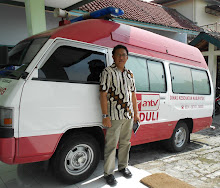"Primary Health Care (PHC) was introduced by the World Health Organization (WHO) about the 70's, with the aim to improve public access to quality health services. In Indonesia, PHC has 3 (three) main strategies, namely multi-sectoral collaboration, community participation, and application of technology to suit the needs with the implementation of the community ", said Minister of Health when officially opening the 14th Medical Association of South East Asian Nation (MASEAN) Mid-term Meeting in Savoy Homann, Bandung (6.17).
According to the Declaration of Alma Ata (1978) PHC is the first contact of individuals, families, or communities with the service system. This understanding accords with the definition of the National Health System (SKN) in 2009, which states that the Primary Health Efforts are basic health measures where there is a first contact with the individual or community health services.
According to the Minister of Health, in support of the first PHC strategy, the Ministry of Health adopted the inclusive value, which is one of five values that must be applied in the implementation of health development, which is pro-people, inclusive, responsive, effective, and clean.
The second PHC strategy, in line with the mission of the Ministry of Health, namely 1. Improving the health of society, through community empowerment, including the private sector and civil society; 2. Protect public health by ensuring the availability of health efforts are complete, uniform quality and fairness; 3. Ensuring the availability and equitable distribution of health resources; and 4. Creating good governance governance.
In Indonesia, the implementation of PHC implemented in health centers and community-based networks and community participation, the village health post and IHC in all districts and villages.
For the third strategy, the Ministry of Health currently has one program that is saintifikasi herbs which began in 2010 and aims to improve access and affordability of the community against drugs. This program allows the herbal medicine is a traditional herbal medicines that are commonly used by people of Indonesia, can be registered and have a marketing authorization so that it can be integrated within the formal health services.
She added, to achieve the successful implementation of PHC to the community, both cross-sectoral collaboration is needed and regionally, especially in Southeast Asia.
"Therefore, the meeting theme" The Role of Primary Health Care Towards Population Health in ASEAN "in line with the efforts made by the Ministry of Health to improve the health of the community" said Minister of Health.
Attending the event, Chairman of the Indonesian Doctors Association (IDI), dr. Prijo Sidipratomo; Chairman of MASEAN, Prof.. Kyaw Myint Naing; and representatives of ASEAN Secretariat Non-Communicable Disease Division, dr. Ferdinal Fernando; and a number of medical associations delegates from 7 countries (Singapore, Thailand, Malaysia, Philippines, Vietnam, Myanmar and Indonesia).
MASEAN or Medical Association of South East Asian Nations was formed in 1980 in Penang, Malaysia and received approval from ASEAN on January 30, 1981 with the status of non-governmental cooperation.
This information is published by the Center for Public Communication, Secretariat General of the Ministry of Health. For further information please contact via telephone number: 021-52907416-9, fax: 52921669, Call Center: 021-500567, 30413700,
skip to main |
skip to sidebar
Jalan Datuk Laksemana Kpg. Pasar Daik Lingga - Kab. Lingga
Pages
Pemilik Klinik
Popular Posts
-
1. Bagaimana cara untuk mendapatkan pelayanan askes di Klinik Mulia? Jawab : Peserta askes mendaftar terlebih dulu untuk menjadi ...
-
A pa itu jerawat (acne vulgaris)? Acne vulgaris, atau acne (jerawat), merupakan masalah kulit yang dimulai ketika minyak dan sel kulit mat...
-
"Primary Health Care (PHC) was introduced by the World Health Organization (WHO) about the 70's, with the aim to improve public a...
Daftar Isi
- Cara Mendapatkan Pelayanan ASKES di Klinik Mulia (1)
- Cara Melawan atau Mengobati Hepatitis (1)
- Implementation Primary Health Care (1)
- Klinik Mulia Disertai Dengan Apotik (1)
- Klinik Mulia Melayani ASKES (2)
- Rumus Untuk Menghitung Berat Badan Yang Ideal (1)
- Sekilas Tentang Klinik Mulia (1)
- Susu Formula yang Baik untuk Bayi (1)
- Tips Diet Yang Sehat (1)
- Tips Mengatasi Kulit Berminyak (1)
- Tips to Reduce or Eliminate Stress. (1)
- Tips Untuk Menghilangkan Jerawat (1)
- Tips Untuk Meningkatkan Kesehatan (1)
Layanan Konsultasi
Copyright ©
KLINIK MULIA |
Designed By AGUSTIANSYAH



